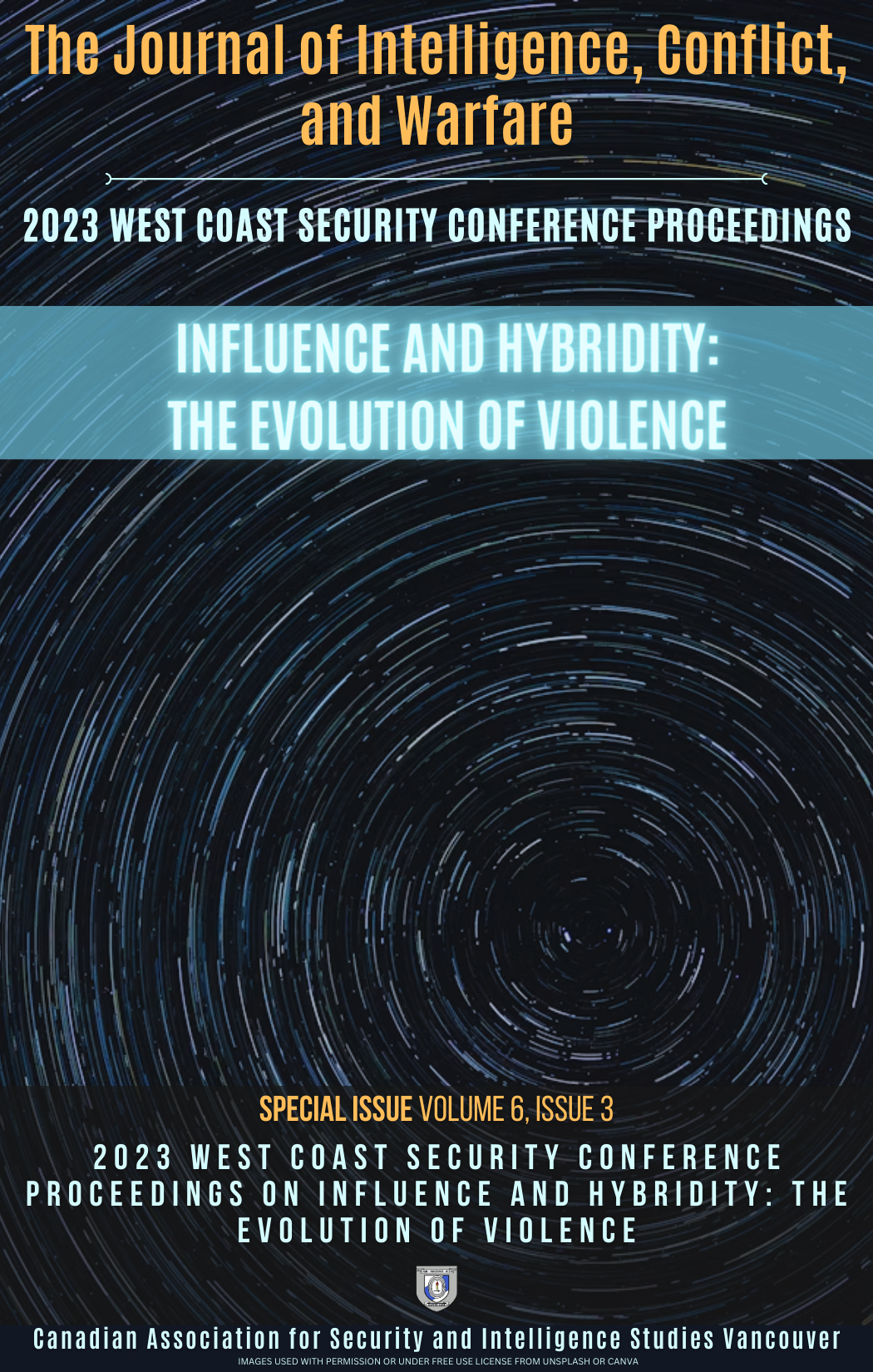Vol. 6 No. 3 (2024)
I am pleased to present Volume 6, Issue 3 of the Journal of Intelligence, Conflict, and Warfare inspired by CASIS Vancouver’s 6th Annual West Coast Security Conference, Influence and Hybridity: The Evolution of Violence. This year’s event featured nearly fifty speakers across five days and built off the success of the past five years. The conference has seen growth in both scope and attendance, and the focus of this year’s event was to provide a more nuanced understanding of contemporary violence, taking into account shifts in the international system and nature of warfare. Through three days of online speakers and a fourth featuring a competence-based online War Games and Contemporary Conflict Workshop, leading experts, academics, and practitioners came together to further analyse and unpack the contemporary security landscape. Additionally, we transitioned away from a strictly online environment for the first time in three years, hosting an interactive Intelligence Workshop on accountability and best practice, featuring representatives of the National Security and Intelligence Review Agency (NSIRA), the National Security and Intelligence Committee of Parliamentarians (NSICOP), the Privy Council Office Community of Practice (PCO), and Office of the Intelligence Commissioner (OIC).
The pieces included in this edition complement the discussions from this year’s West Coast Security Conference, building off of and developing key themes explored by the speakers’ presentations and workshop proceedings. We were privileged to welcome Dr. Loch K. Johnson back to the conference, where he spoke extensively on the topic of intelligence in the age of hegemonic instability. We are happy to host a new piece of work from Dr. Johnson to open this edition, “Intelligence Collection Priorities In An Age Of Renewed Superpower Conflict: Toward A More Expansive Perspective”, which expands on his conference proceedings and draws from his prolific body of work. The piece examines the broad intelligence landscape that emerged for open societies following the Cold War and, most importantly, makes us consider what this means for the future of global democracy in a time of hegemonic conflict, providing insight into the potential path forward. Dr. John Gilmour has been welcomed into the CASIS Vancouver fold, bringing a wealth of experience from his years of service in the PCO and CSIS. We are pleased to host a special conference piece from Dr. Gilmour beginning on page 32 of this edition that fits perfectly into the research purview of CASIS Vancouver, providing an in-depth and penetrating contribution to recent discussions of how terrorism is situated and considered within the broader context of extremism and national security in Canada. Beginning on page 78, Dr. Taofeek Oluwayomi Gidado and Temitope Abeeb Yusuf examine the relationship between police and the public in Nigeria with their study into the normalization of vigilante groups for crime prevention and the resulting impacts on the security architecture of the state. Lastly, briefing notes were prepared for each speaker at the conference to provide those who were unable to join us with a written synopsis of the key themes and research presented on Expanding Intelligence Toolkits, Extremism and Identity, Information Warfare, Proactive Policing, and Soft Violence. The findings provide insight into a world shifting away from the liberal system and provide clarity to often misunderstood topics such as Hybrid Warfare and threats to human infrastructure, while emphasizing the increased importance of education, collaboration, and joint interoperability.
Lastly, it was our privilege to welcome back our friend Randolph H. Pherson to the West Coast Security Conference in November, prior to his passing at the beginning of 2024. We would like to take this opportunity to honour Mr. Pherson and acknowledge his work and person. Mr. Pherson was the co-author of Richards J. Heuer, Jr. and a leader in the international intelligence community, known for his development of Structured Analytic Techniques (SATs), authorship of multiple books on analytic thinking and presentation, and years of teaching and mentorship internationally. We are privileged to present one of the last pieces of research by Randolph H. Pherson, “Creative Strategies for Dealing with Disinformation”, which can be found on page 264 of this edition. In it, he outlines his analytic prescriptions for countering the threat of disinformation, providing us with yet another example of the utility of critical, practical, and structured analysis in the field.
The key pillars of CASIS Vancouver are the communication and creation of new knowledge and research in the security space, and our purpose is to provide the handshake between academics and practitioners. It is my hope is that these articles and briefings will inspire others to further discussion and research on contemporary and emerging security threats, and I look forward to the wide range of engaging submissions to this journal in the coming months.
Sincerely yours,
Candyce Kelshall
